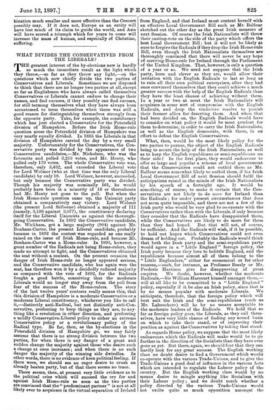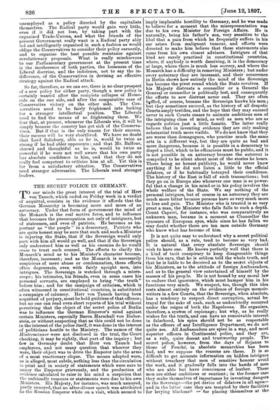WHAT DIVIDES THE CONSERVATIVES FROM THE LIBERALS?
THE greatest interest of the by-elections now is hardly so much the immediate result as the light which they throw,—so far as they throw any light,—on the questions which now chiefly divide the two parties of Conservatives and Liberals. Sometimes we are disposed to think that there are no longer two parties at all, except so far as Englishmen who have always called themselves Conservatives or Liberals cannot endure to change their names, and find excuses, if they possibly can find excuses, for still terming themselves what they have always been accustomed to term themselves when there was still a good reason for distinguishing themselves strongly from the opposite party. Take, for example, the constituency which has just elected a Conservative for the Petersfield division of Hampshire. Before the Irish Home-rule question arose the Petersfield division of Hampshire was very nearly equally divided. In 1885 the Liberals in that division of Hampshire carried the day by a very small majority. Unfortunately for the Conservatives, the Con- servative party was divided by the appearance of two Conservative candidates,—Mr. Nicholson, who was the favourite and polled 3,253 votes, and Mr. Henty, who polled only 179 votes. The whole Conservative vote was, therefore, only 3,432, and exceeded the Liberal vote for Lord Wolmer (who at that time was the only Liberal candidate) by only 18. Lord Wolmer, however, succeeded, but only because the Conservative party was divided. Though his majority was nominally 161, he would probably have been in a minority of 18 or thereabouts had Mr. Henty not gone to the poll. But when the Irish Home-rule question came up, the Unionist party obtained a comparatively easy victory. Lord Wolmer (the present Lord Selborne) obtained a majority of 111 (namely, 3,188 against 3,077), the constituency declaring itself for the Liberal Unionists as against the thorough- going Conservative. In 1892 the Conservative candidate, Mr. Wickham, got a large majority (904) against Mr. Bonham-Carter, the present Liberal candidate, probably because in 1892 the contest was regarded as one really raised on the issue of Irish Home-rule, and because Mr. Bonham-Carter was a Home-ruler. In 1895, however, a great number of the Radicals not being Home-rulers, they made no attempt to fight, and the Conservatives obtained the seat without a contest. On the present occasion the danger of Irish Home-rule no longer appeared serious, and the Conservative candidate, who has again won the seat, has therefore won it by a decidedly reduced majority as compared with the vote of 1892, for the Radicals fought a good battle, conceiving that the moderate Liberals would no longer stay away from the poll from fear of the success of the Home-rulers. The story of the last twelve years' contests really means this, that this division of Hampshire is a moderate Conservative or a moderate Liberal constituency, whichever you like to call it,—distinctly anti-Radical, but not distinctly anti-Con- servative, preferring to keep things as they are, to any- thing like a revolution in either direction, and preferring a mildly Conservative-Liberal policy to either an extreme Conservative policy or a revolutionary policy of the Radical type. So far, then, as the by-elections in the Petersfield division of Hampshire go, we may fairly assume that there is no strong division between the two parties, for when there is any danger of a great and sudden change the majority against those who desire such a change at once increases ; and when there is no such danger the majority of the winning side dwindles. In other words, there is no evidence of keen political feeling. If there were, we should see an eager desire to crush an already beaten party, but of that there seems no trace.
There seems, then, at present very little evidence as to the political cries which will succeed the cry for and against Irish Home-rule so soon as the two parties are convinced that the" predominant partner" is not at all likely ever to acquiesce in the virtual separation of Ireland from England, and that Ireland must content herself with an effective Local Government Bill such as Mr. Balfour sketched out the other day as the great Irish measure of next Session. Of course the Irish Nationalists will throw their casting-vote on the side of the party which offers the best Local Government Bill ; but it will not be likely at once to forgive the Radicals if they drop the Irish Home-rule Bill, even though the Irish Nationalists themselves are thoroughly convinced that there will never be any hope of carrying Home-rule for Ireland through the Parliament of the United Kingdom. That, however, is only a question of a year or so. We need not suppose that the Irish party, keen and clever as they are, would allow their irritation with the English Radicals to last so long as to ruin all their own political enterprises, after they had once convinced themselves that they could achieve a much greater success with the help of the English Radicals than they have the least chance of achieving without them. In a year or two at most the Irish Nationalists will acquiesce in some sort of compromise with the English Radicals, and drop the vindictive resolve to punish their former allies for deserting them. And when that had been decided on, the English Radicals would have to consider on what policy it would be most prudent for them to determine, in order to carry the Irish Nationalists, as well as the English democrats, with them, in an effort to defeat the English Conservatives.
What, then, would be the most likely policy for the two parties to pursue, the object of the English Radicals being to secure the help of the Irish Nationalists, as well as to keep the English republicans or semi-republicans on their side ? In the first place, they would endeavour to offer so large and popular a scheme of local government that the Conservatives could not outbid them as Mr. Balfour seems somewhat likely to outbid them, if his Irish Local Government Bill of next Session should fulfil the anticipations raised in the minds of the Irish Nationalist* by his speech of a fortnight ago. It would be something, of course, to make it certain that the Con- servatives are not likely to do more for Ireland than the Radicals ; for under present circumstances that does not seem quite impossible, and there are not a few of the Irish party who would be very glad to co-operate with the Conservatives rather than with the Liberals, if only because they consider that the Radicals have disappointed them, while the Conservatives are likely to do more for them than they had hoped. But that will not, of course, be sufficient. And the Radicals will wish, if it be possible, to hold out hopes which Conservatives could not even dream of holding out. Probably the Radicals would think that both the Irish party and the semi-republican party would agree in a "Little England" foreign policy, the Irish party because they love to belittle England, and the republicans because almost all of them belong to the "Little Englanders," either for economical or for other reasons,—such, for instance, as Professor Beesly or Mr. Frederic Harrison give for disapproving of great empires. We doubt, however, whether the moderate Radicals,—Sir William Harcourt himself amongst them,— will at all like to be committed to a, "Little England" policy, especially if it be also an Irish policy, since that is by no means popular with moderate Liberals. We anticipate, therefore, that the foreign policy which will best suit the Irish and the semi-republicans (such as Mr. Labouchere) will be by no means acceptable to the moderate leaders of the Radicals. We hold that so far as foreign policy goes, the Liberals, as they call them- selves, have very little chance of finding any sound basis on which to take their stand, or of improving their position as against the Conservatives by taking that stand.
As regards Home policy, we suppose that the most likely endeavours which the Radicals will make would be to go further in the direction of the Socialists than they have ever gone as yet. But there, again, we should fear that they can hardly look for any great success. The English working class no doubt desire to find a Government which would co-operate with the various Trade-Unions, and to give the Trade-Unions a good deal of influence in the various Acts which are intended to regulate the Labour policy of the country. But the English working class would by no means desire to mingle anything like Socialism with their Labour policy ; and we doubt much whether a policy directed by the various Trade-Unions would not excite quite as much opposition amongst the unemployed as a policy directed by the capitalists themselves. The Radical party would gain very little, even if it did not lose, by taking part with the organised Trade-Unions, and. what the friends of the present Government really want is a Radical party ably led and intelligently organised in such a fashion as would oblige the Conservatives to consider their policy earnestly, and to organise the best possible resistance against revolutionary proposals. What is really mischievous to our Parliamentary government at the present time is the incoherence of both parties, the looseness of the Liberal doctrine, and the indolence, not to say the in- difference, of the Conservatives in devising an effective strategy against the Radical attack.
So far, therefore, as we can see, there is no clear prospect of a new policy for either party, though a new policy is certainly wanted after the complete collapse of Home- rule on the one side, and after the comparative ease of Conservative victory on the other side. The Con- servatives need to be fairly frightened into looking for a stronger intellectual position. The Liberals need to find the means of so frightening them. We fear that, at present, whenever the Liberals win, it will be simply because the country has got sick of the Conserva- tives. But if that is the only reason for their success, their success will be very shortlived. We have no doubt that Lord Salisbury, able as he is, would be twice as strong if he had abler opponents ; and that Mr. Balfour, shrewd and thoughtful as he is, would be twice as powerful if he were not well aware that his own party has absolute confidence in him, and that they do not really feel competent to criticise him at all. Yet this is far from a satisfactory situation. The Conservatives need stronger adversaries. The Liberals need stronger leaders.



































 Previous page
Previous page